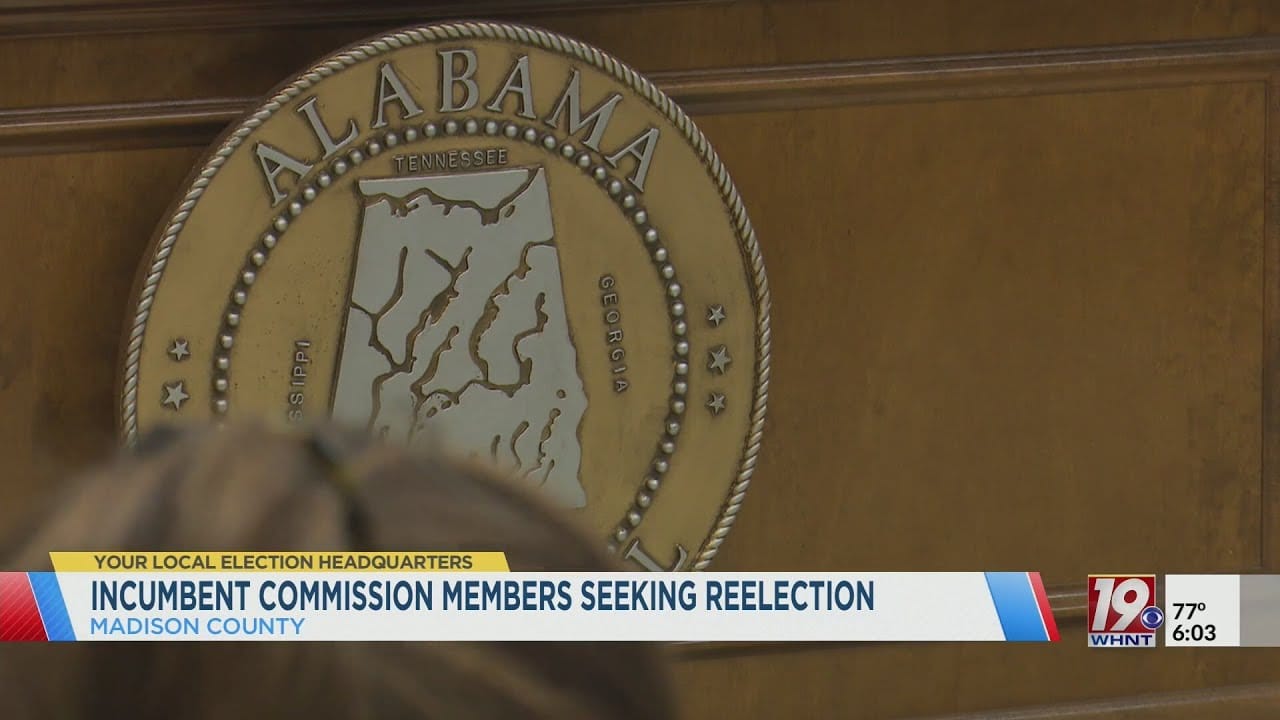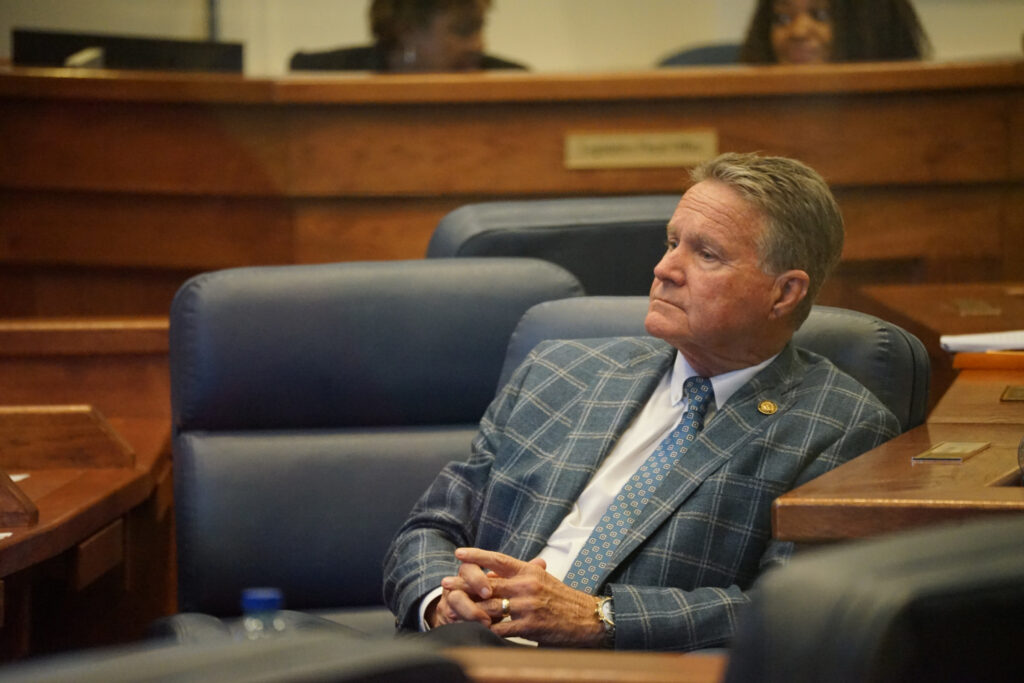News from the South - Alabama News Feed
All Madison County Commissioners Seeking Reelection on Tuesday | Oct. 31, 2024 | News 19 at 6 p.m.

SUMMARY: Several local offices, including the Madison County Commission, are on the ballot for Tuesday’s election. These commissioners are tasked with managing budgets, maintaining roads, and overseeing community projects. Incumbent candidates, including Tom Brandon (District 1), Steve Carraway (District 2), Phil Vandiver (District 4), Phil Riddick (District 5), and Violet Edwards (District 6), have emphasized their experience and familiarity with local needs. Each has worked on various important projects and aims to improve quality of life in their districts. Challengers will also be on the ballot, with more details available in upcoming coverage.

Several local offices will be on your ballot on Tuesday, including members of the Madison County Commission.
News 19 is North Alabama’s News Leader! We are the CBS affiliate in North Alabama and the Tennessee Valley since November 28, 1963.
https://whnt.com/
https://www.facebook.com/whntnews19
https://www.instagram.com/whntnews19/
https://twitter.com/whnt
News from the South - Alabama News Feed
Panoply 2025’s Musical Guests | April 18, 2025 | News 19 at 9 a.m.

SUMMARY: Panoply 2025, set for April 25-27, will feature a diverse lineup of live music, including rock, R&B, smooth jazz, and local acts such as Alana White and The Red Flags. Headliner Billy Allen and The Polly’s will perform on Friday night. New this year are DJ sets between performances, generating excitement among attendees. The event will offer a range of activities, including food and entertainment. Tickets are $15 for a weekend pass, with parking and logistics advised for ease. The festival’s website and Huntsville social media will provide updates on weather and other event details.

Panoply 2025 is a week from today! Patrice Johnson with Arts Huntsville swung by News 19 at 9am to tease this year’s musical guests!
News 19 is North Alabama’s News Leader! We are the CBS affiliate in North Alabama and the Tennessee Valley since November 28, 1963.
https://whnt.com/
https://www.facebook.com/whntnews19
https://www.instagram.com/whntnews19/
https://twitter.com/whnt
News from the South - Alabama News Feed
Alabama House committee approves Senate version of cell phone ban

by Anna Barrett, Alabama Reflector
April 16, 2025
The Alabama House Education Policy Committee Wednesday unanimously approved a bill that would ban cellphones in public schools during class instruction time.
SB 92, sponsored by Sen. Donnie Chesteen, R-Geneva, is identical to HB 166, sponsored by Rep. Leigh Hulsey, R-Helena, which passed the House earlier this month.
“It is identical to the way that we passed it out of the House and amended it on the floor recently. So we’re making sure that they’re tracking identically, and we have been able to successfully do that,” Hulsey, who carried the bill for Chesteen, said Wednesday.
GET THE MORNING HEADLINES.
The bill requires local school boards to adopt a policy to store student cell phones during class hours. Some schools use Yondr Pouches to store phones, but the legislation does not specify how a phone should be stored.
“They just have to turn the phone off, store it off your person in a locker, car, whatever your storage solution is, it’s a similar solution. Whatever they choose,” Hulsey said.
There are three exceptions for when a student can access their phones: if they study under an Individualized Education Plan that allows it; for teacher-approved instruction and for medical purposes.
The bill was approved with no discussion. It moves to the full House for consideration.
YOU MAKE OUR WORK POSSIBLE.
Alabama Reflector is part of States Newsroom, a nonprofit news network supported by grants and a coalition of donors as a 501c(3) public charity. Alabama Reflector maintains editorial independence. Contact Editor Brian Lyman for questions: info@alabamareflector.com.
The post Alabama House committee approves Senate version of cell phone ban appeared first on alabamareflector.com
News from the South - Alabama News Feed
Foley man wins Race to the Finish as Kyle Larson gets first win of 2025 Xfinity Series at Bristol

SUMMARY: Kyle Larson dominated the 2025 Xfinity Series race at Bristol, leading 277 of 300 laps and claiming his first win of the season. Despite a few scary moments, Larson maintained control, finishing with only 12 cars on the lead lap. He also won the Cup Series race on Sunday. James Livingston from Foley won a NASCAR hat in a prediction contest, joining 11 others in a chance to win tickets to the NASCAR Xfinity Championship in Phoenix. The Xfinity Series will return to Rockingham for Easter weekend, with Casey Kane making his return to racing.

Kyle Larson started on the pole at Bristol and ended Saturday’s race in victory lane.
VOTE IN RACE TO THE FINISH: https://trib.al/ywIZElR
-

 News from the South - Arkansas News Feed7 days ago
News from the South - Arkansas News Feed7 days agoMeasles cases confirmed in Arkansas children after travel exposure
-

 News from the South - Alabama News Feed7 days ago
News from the South - Alabama News Feed7 days agoImpacts of Overdraft Fees | April 11, 2025 | News 19 at 10 p.m.
-

 News from the South - Georgia News Feed7 days ago
News from the South - Georgia News Feed7 days ago1-on-1 with Gov. Kemp’s Senior Advisor | Full interview
-

 Mississippi Today5 days ago
Mississippi Today5 days agoOn this day in 1873, La. courthouse scene of racial carnage
-

 Local News6 days ago
Local News6 days agoAG Fitch and Children’s Advocacy Centers of Mississippi Announce Statewide Protocol for Child Abuse Response
-

 News from the South - Missouri News Feed7 days ago
News from the South - Missouri News Feed7 days agoMom and son targeted in carjackings, stolen cars crime spree
-

 Local News5 days ago
Local News5 days agoSouthern Miss Professor Inducted into U.S. Hydrographer Hall of Fame
-

 News from the South - Arkansas News Feed7 days ago
News from the South - Arkansas News Feed7 days agoFederal investigators looking into cause of deadly NYC helicopter crash








































